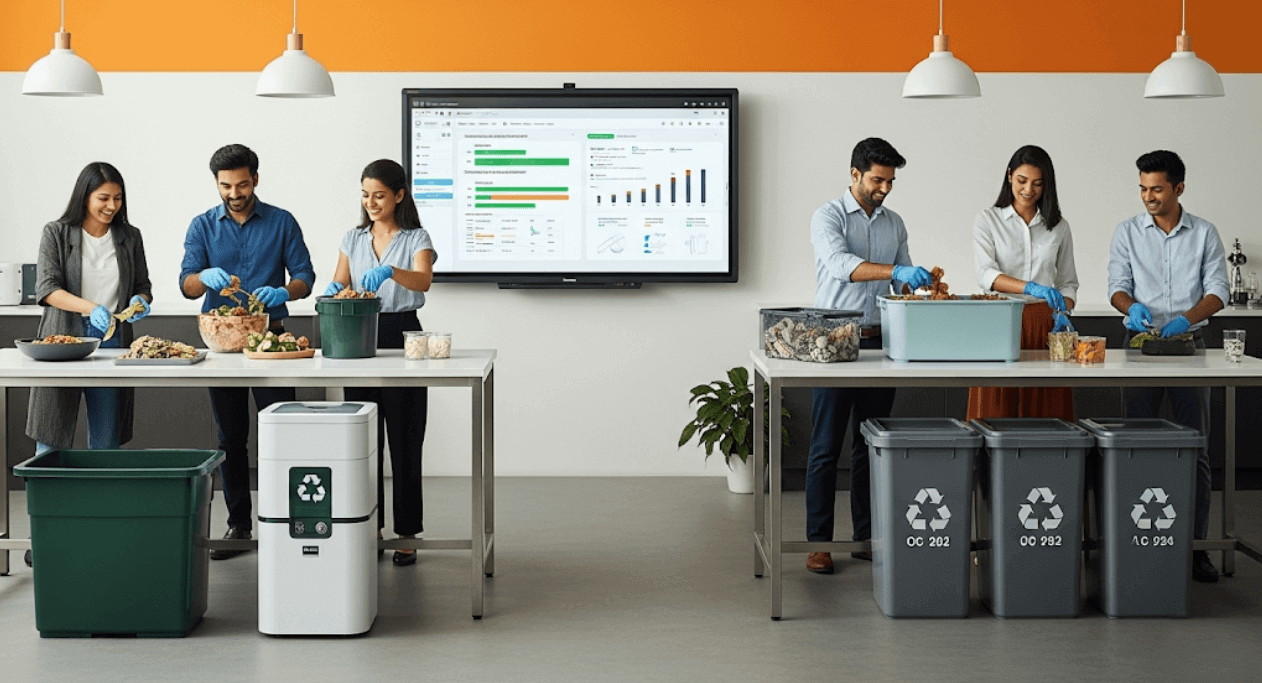- Introduction
- 1. Food Waste Solutions for Corporates Through Global and National Initiatives
- 2. Use Advanced Tracking and Monitoring Systems
- 3. Set Clear Goals and Track Progress
- 4. Engage and Educate Consumers and Employees
- 5. Optimise Packaging Design
- 6. Adopt Circular Economy Principles
- 7. Improve Operational Efficiency
- Final Thoughts
Introduction
Food waste solutions for corporates are becoming essential as businesses seek to align with sustainability goals and reduce operational inefficiencies. Corporations have the power to lead systemic change—not just within their own operations, but across the entire supply chain.
By embracing smart strategies, adopting innovative technologies, and engaging both internal teams and external stakeholders, businesses can significantly cut down on food waste.
In this blog, we explore how companies can drive meaningful impact through actionable, scalable food waste solutions tailored for the corporate sector.
1. Food Waste Solutions for Corporates Through Global and National Initiatives
One of the most effective food waste solutions for corporates is active participation in large-scale global and national efforts.
These initiatives provide a collaborative platform for companies to align their waste reduction goals with broader sustainability targets and helps to learn how corporate food donation supports ESG targets and enhances sustainability efforts.
A prime example is the 10x20x30 initiative, which unites major food retailers and their suppliers in a mission to cut food waste in half by 2030.
This program fosters shared processes for measuring food loss, encourages transparency, and builds accountability throughout the value chain.
On a global level, the importance of food waste reduction surged in 2015 with the introduction of the UN’s Sustainable Development Goal 12 (SDG 12)—focused on sustainable consumption and production.
Within this, Target 12.3 aims to halve global food waste at the retail and consumer levels and reduce losses across the supply chain. Over 200 leading food businesses have formally committed to achieving this target.
In addition to global targets, corporates can join voluntary national programs like the Courtauld Commitment in the UK and the U.S. Food Waste Pact, led by ReFED and WWF.
These initiatives provide businesses with data-driven tools, sector-specific strategies, and cross-industry partnerships to accelerate waste reduction.
By aligning with these established frameworks, companies gain access to resources, benchmarks, and a global network, making their efforts more impactful and measurable.
2. Use Advanced Tracking and Monitoring Systems
Another powerful food waste solution for corporates is the use of smart tracking technologies and data-driven systems. These tools help companies identify exactly where and how food waste is occurring within their operations.
By forming strategic partnerships with AI and tech companies, businesses can implement intelligent monitoring systems that deliver detailed waste data. A standout example is IKEA, which reduced its food waste by 54% in just four years. This shift not only saved the company $37 million, but also prevented nearly 40,000 tons of carbon emissions.
In addition, the use of food waste management software supports daily operations by offering actionable insights. These systems enable precise tracking, help minimise unnecessary disposal, and empower staff to make better decisions across the supply chain.
For corporates seeking measurable impact and operational efficiency, investing in advanced waste tracking is a cost-effective and scalable solution.
3. Set Clear Goals and Track Progress

Successful food waste solutions for corporates depend on setting measurable goals and tracking progress regularly.
Start by conducting a food loss and waste assessment. This helps identify current waste levels, root causes, and reduction potential.
Define SMART goals—Specific, Measurable, Achievable, Relevant, and Time-bound. For example, aim to reduce food waste by 20% in the first year through improved inventory practices.
Track key metrics such as:
- Total food waste generated
- Diversion rates from landfills
- Cost savings from reduced waste
- Carbon footprint reductions
Regular reporting is vital. It keeps teams accountable and helps refine strategies over time.
Maintain transparency with stakeholders. Share updates via sustainability reports, social media, and industry platforms.
Open communication builds trust, encourages collaboration, and promotes industry-wide improvements.
4. Engage and Educate Consumers and Employees
One of the most impactful food waste solutions for corporates is education—both internally and externally.
Start by raising awareness among consumers. Help them understand the scale of food waste and offer simple tips to reduce it.
IKEA sets a strong example. Its website guides customers on reducing household food waste and promotes reusable containers and sorting bins.
General Mills partnered with Betty Crocker’s #TasteNotWaste challenge. The campaign teaches families how to cook, store, and freeze food more efficiently.
Since households generate the most food waste, it’s smart to involve employees in education too. Many people want to waste less but don’t know how.
Create training and engagement programs for staff. Focus on food handling, inventory, and waste segregation. Encourage feedback and ideas for improvement.
This builds a culture of sustainability and turns employees into advocates for reducing food waste at work and at home.
5. Optimise Packaging Design
Thoughtful packaging is an underrated food waste solution for corporates.
It protects food, extends shelf life, and guides consumer behaviour.
The Sustainable Packaging Coalition (SPC) offers best-practice guidelines to help companies make smarter packaging choices.
Though packaging only accounts for 3–3.5% of climate impact, better design can reduce spoilage and environmental harm.
Transparent packaging lets consumers judge freshness. But it can also speed up spoilage from light exposure.
IKEA plans to phase out plastic packaging by 2028, shifting to more sustainable materials.
By rethinking packaging, businesses can cut food waste, appeal to eco-conscious buyers, and reduce their footprint.
6. Adopt Circular Economy Principles
One of the most sustainable food waste solutions for corporates is embracing circular economy principles.
A circular food system ensures that no edible food becomes waste. It supports climate goals, biodiversity, and long-term business resilience.
Start with food donation. Build partnerships with NGOs that can collect and redistribute surplus food to those in need.
Next, explore food upcycling—turning food scraps or by-products into new, high-value items instead of discarding them.
Identify food loss hotspots across your supply chain. Target improvements in storage, logistics, and inventory practices.
Follow the WRAP food waste hierarchy:
- Prevent waste first
- Donate to people
- Redirect to animal feed
- Recycle through composting or anaerobic digestion
Composting and digestion create valuable resources like compost or biogas, turning waste into energy or soil enhancers.
These circular strategies not only reduce waste but also generate new revenue streams and build brand credibility.
7. Improve Operational Efficiency
Boosting efficiency is one of the most practical food waste solutions for corporates.
Start by conducting regular audits to pinpoint where waste is happening. This helps identify patterns and weak points in your supply chain.
Use strict inventory controls to avoid over-purchasing. Managing stock better reduces spoilage and cuts unnecessary costs.
For meetings and events, adopt waste-conscious practices.
Take pre-orders, limit portions slightly, fine-tune guest counts, and provide to-go containers.
Work with foodservice vendors to align on shared waste reduction goals. Discuss flexible menus or smaller portion options to reduce overproduction.
Simple operational changes can lead to big savings and a leaner, more sustainable business model.
Final Thoughts
Implementing targeted food waste solutions for corporates creates real, lasting impact.
Businesses that take action can significantly reduce food waste, improve public health, and support global sustainability goals.
The benefits go beyond the environment. Companies can unlock cost savings, reduce emissions, strengthen supply chains, and build a reputation for responsibility.
In today’s climate-conscious world, reducing food waste is no longer optional. It’s a smart, strategic business move.
Ready to take the next step toward sustainable operations?
Partner with Reshine Organisation to implement practical food waste solutions that align with your CSR goals.
Contact us today to reduce waste, feed communities, and build a stronger, greener brand.




